

Freedom is won but... |
"With Bapu out of the jail, a new hope came into all hearts, and people found fresh courage, for once again they had someone who could feel for them and share their sorrow. India Is DividedFor some time, Gandhiji lived in Juhu and Poona and tried to regain his health. As soon as he was better, he threw himself into the National Movement and once again assumed its leadership. He opened the people's eyes to their mistakes, and also pointed to the government where they had been in the wrong. Once again, he threw in all his weight to persuade the British to transfer power to the Indians, but the British were in no mood to do so. They said that they would be willing to quit India only if the Hindus and the Muslims could settle their differences and ask for independence with one voice. Mahatmaji argued that Hindus and Muslims were both children of the same country, and that their differences were a mere domestic quarrel which they could settle as they liked. The British should not interfere in this domestic quarrel, or make this the excuse for refusing to give India her freedom. But there was bitterness and division in our ranks, and we were like the two cats who quarrelled over a loaf of bread and called in a monkey to divide it equally between them. The monkey would put the two pieces in the scales and eat up a larger slice now from one piece, now from the other, pretending to equalize them, until he had eaten away the entire loaf and the two cats looked helplessly at each other, growing wiser only after the event. In the same way the Hindus and Muslims quarrelled with each e other and the agents of the British offered to divide the country into two parts - India and Pakistan. Our leaders at length agreed to this proposal, for they felt that it brought them freedom even though it meant dividing the country. Little did they realize that this division would sow the seeds of hatred and ill-will all over. Riots Break OutFrom all parts of the country there came news that was heartrending and alarming. There were already disturbances going, on in the Punjab, when fighting between the Hindus and the Muslims broke out in Calcutta. There was bitter hatred between the two communities, and men and women who had so far lived as peaceful neighbours now became sworn enemies. Gandhiji was greatly worried over the turn of events and he proceeded to Calcutta to see things with his own eyes. He found that the reports that had reached his ears were only too true. Hindus and Muslims who had lived together in friendship for generations past, were now after each other's blood. The first thing that Bapu did was to call a mass meeting in the Calcutta Maidan. The response was amazing. Hindus and Muslims, who had hitherto hated the very sight of each other, poured in by the thousands to listen to Bapu's words. Gandhiji talked to them about the power of love and the value of goodwill, and in the twinkling of an eye, all hatred and ill-will seemed to have vanished into thin air. He then called upon both Hindus and Muslims to bring their weapons and lay them before him. People were not yet ready for this. Gandhiji at once saw that his message had not gone home, doubt and suspicion still remained in the hearts of people. And so he decided to go on a fast, so that the hearts of people might be cleansed. 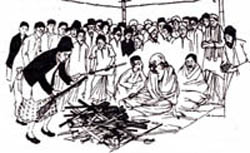 As soon as the news of his fast went round, the people of Bengal were struck with fear and sorrow. They came in hundreds and surrendered their weapons to him and pledged themselves to live in friendship and peace. And they kept their word and never fought with each other again. Bapu was working hard to bring back goodwill among the Hindus and Muslims. If Gandhiji brought about peace and friendliness at one place, quarrels would break out at another. Just then news came that Muslims of Noakhali were killing and plundering the Hindus there. The frail old man immediately started for that place. He scorned all danger, and went about preaching his gospel of love from village to village. Often he had to journey on foot and sometimes he even walked barefoot. He lived and moved with the villagers of Noakhali. He ate with them and slept with them. He talked to people, and asked them to stop fighting each other and to return the plundered goods to their rightful owners. He called back those who had become homeless and put them again in their homes. He restored the displaced and the desolate to their friends, and strove in every way to bring order out of confusion. In Bihar-Preaching LoveAfter Noakhali, trouble broke out in Bihar. The Hindus there burnt down entire villages in which Muslims lived; passions ran high and hatred was let loose once again. When Bapu heard all these he was full of grief and set out for Bihar at once. Again he preached his gospel of love and told the people that it was a sin to take anyone's life. Hindus and Muslims alike were the natives of the same country. They had lived together for generations and centuries, and , they had to live together. Why hate and kill each other, then? This was how he talked to them. In the beginning they did not pay heed to his words, but slowly and gradually, the small feeble voice of Truth touched their hearts; they began to realize that they were human beings and not beasts of prey. They vowed to keep the peace and cherish love and goodwill. In those unhappy days, Bapu worked continuously and feverishly. He forgot his food and his sleep; he was unmindful alike of freezing cold and scorching heat. He would wander barefoot in the villages of Noakhali or go from place to place in Bihar, bringing help to the distressed and peace to broken hearts. Not for a moment did he lose hope; not for a moment was his faith shaken. Trials and difficulties gave him more courage; suffering and hardship made him more gentle. India Wins Freedom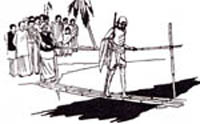 At last in 1947 came the day when India was free; there was joy and enthusiasm in every heart. But the dawn of freedom was marred by clouds of hatred and ill-will. Murder and bloodshed were going on unchecked in the country. Communal passion had blinded us and we had strayed into darkness. The bonds of love had snapped; people were after each other's blood. Men had become murderous like wild beasts, and Hindus and Muslims thirsted for each other's blood. A gloom had settled upon the country, but even in that terrible time, one or two beacon lights shone faintly and fought to drive away the darkness." "What were those beacon lights, mother?" "These lights, my child, were none other than Bapu and his colleagues. But somehow we had turned our eyes from them. Hindus, Muslims and Sikhs were killing each other. The goonda37 thought it a golden opportunity: They pillaged and plundered and robbed and murdered. Innocent men and women had to suffer and the world was shocked at the savagery which had seized our country." Hari was deeply affected by this narration; he was sad and lost in thought for some time. At last he spoke out, "Alas! mother, how it must have grieved Bapu to see Hindus and Muslims and Sikhs doing such acts. It must have broken his heart." "Yes, my child. His heart was sore and he would often say, 'Oh God, I cannot bear this killing and looting any more. Take me from world'. 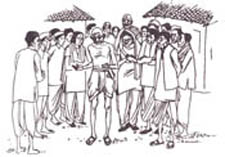 When peace had been restored in Noakhali and Bihar, Bapu started for the Punjab. But just then rioting broke out in Delhi. What happened then is such a recent matter and I suppose you remember it all very vividly. They were terrible days. Bapu stopped in Delhi; he could not go Punjab when people were fighting against each other in the very capital of India. He found that displaced Punjab had poured into Delhi by the thousand. They were bitter and angry, and they seemed to have been the cause of the outburst in Delhi. Bapu was in full sympathy with them, but he also realised that, if once things went out of control in Delhi, confusion and disorder would spread to the whole country and destroy it." "What did he do, then, mother?" He thought over the matter calmly and carefully. He called the important officials of Delhi and urged upon them to treat the Hindus and the Muslims alike with complete impartiality. He asked them to be watchful and careful. He then went to the refugees. He assured them of sympathy and help, and explained to them that whatever the Muslims of the Punjab might have done to them, the Muslims of Delhi had not harmed them in any way. It would be madness to try to avenge their wrongs upon people who were innocent. He also appealed to the Muslims of Delhi to help the refugees as best they could. 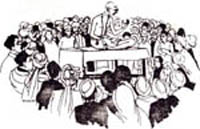 But people had lost their heads. Frenzy and passion had clouded their vision. Gandhiji then decided to undertake another fast: he might succeed in bringing the Hindus, Muslims and Sikhs together by laying down his own life. There was a Commotion in Delhi: no one knew what should be done. At length the leaders of various communities went to Bapu and assured him that they would risk their own lives in order to restore peace and goodwill in Delhi. As soon as Gandhiji was convinced of the sincerity of these leaders, he broke his fast, and from that moment conditions in Delhi began to improve steadily." "I remember the day when Bapu broke his fast, mother. There was rejoicing all over the country." "You are right, my son, Gandhi's fast had a great effect on all good people, but there were some who did not approve of his efforts in the case of Hindu-Muslim unity. They thought that such attempts would weaken India, and that the only way of becoming strong was to return bullet for bullet. To try to overcome evil, with good was, according to them, a sign of weakness and cowardice. They also knew that as long as Bapu was alive, he would continue to strive for harmony between all communities, and that he would not heed to their evil counsel. And so there was only one way for them, and that was to kill Bapu. The Light Goes Out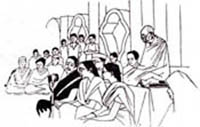 Bapu was in the habit of having his evening meals early, and exactly at 5 o'clock he used to hold his prayer meetings. Men and women would gather for these meetings long before appointed hour, and as Bapu passed through the crowd, people would bow and greet and touch his feet, Bapu would sit on a low dais surrounded by his associates and read the Koran and Gita or sing hymns. The prayer would begin with some recitations from the Koran and then there would be readings from the Gita and the singing of hymns. And then Bapu would preach a short sermon, and talk to the people about the situation in the country and in the world. A favourite hymn of Bapu's which would be sung everyday in the prayer meetings began thus: 'Ishwar Allah tere nam There were also other similar hymns which were sung at those meetings. People flocked to his prayer meetings from far and near, and Hindus and Muslims, all sat together and prayed." "I know, mother, I have been to these prayer meetings many times. But I could not understand why Bapu would have readings from the Koran and the Holy Bible alongside those from the Gita." "Because, my dear son, Gandhiji believed that all religions were based on truth. In fact, he used to say that he was a Hindu as well as a Muslim, a Sikh and as well as a Christian. He took all religions as his own, for is not every religion based on the principles of truth and righteousness ? But let me tell you of what happened today. Bapu was walking fast to the prayer meeting, as he was a little late. He was passing through the crowd when a man came towards him as if to touch his feet, and shot at him. He must have been a very cruel and and a heartless man, for none other i could have lifted hic hand at Bapu." The mother saw that Hari was I crying. She took him in her arms and tried to console him. "Do not cry, my child. Gandhiji gave his life in the service of God. Such people never die, they live forever. And in the end victory shall come to them. Victory for Bapu will mean victory for Truth, and victory for Truth will be victory for India. But men and women, young and old, will have to work unceasingly for this. We should not only follow the teachings of Gandhiji ourselves, but help others to do the same. For thirty years. Gandhiji has been teaching us the gospel of Truth, Love and Nonviolence. Whenever we see our brethren going astray and yielding to hate, unrighteousness or violence, we should stretch our loving hands to them and bring them back to the right path. We should never think in terms of Hindus or Muslims, Sikhs or Christians; we should remember that we are Indians first and Indians last. We should all work for Hindu-Muslim unity. India as well as Pakistan should both learn that all communities are alike. God has created the Hindus, the Muslims as well as the Christians, and all must live together in love and harmony.'' Hari suddenly sat up and asked, "Mother, what must I do in order to become a true Indian ?" "There is only one way," answered the mother, "and that is to follow the path that Bapu showed us. We must try and make India a country where there shall be no poverty or suffering, where the strong shall not oppress the weak, where there shall be no distinction of rich and poor, Hindu and Muslim, but all shall be equal, happy and prosperous. We can achieve this end only through Truth, Sacrifice and Perseverance. And Bapu' soul will rest in peace if we can all work sincerely towards this end. It is not necessary that our efforts should bear immediate fruit. There will be many failures and disappointments, but we should not waver or despair. That would be unworthy of Bapu's followers. We should work earnestly and righteously, without worrying about the results. That would be true service of humanity, and thus alone could we become worthy disciples of Bapu." The mother was narrating the story of Gandhiji's life, when Hari's father returned. He had listened to the statements of Pandit Jawaharlal Nehru and Sardar Patel on the radio. He told them that Panditji overwhelmed by the tragedy, and in a voice trembling with emotion, had said, 'Friends and comrades, the Light has gone out of our lives and there is darkness everywhere. I do not know what to tell you and how to say it. Our beloved leader Bapu, as we called him. the Father of the Nation is no more. Perhaps I am wrong to say that. Nevertheless. we will not see him again as we have seen him for these many years, The Light has gone out, I said, and yet I was wrong. For the light that shone in this country was no ordinary light. The light that has illumined this country for these many years will illumine this country for many more years, and a thousand years later, that light will still be seen in this country and the world will see it and it will give solace to innumerable hearts. 'A mad man has put an end to his life, for I can only call him mad who did it and yet there has been enough of poison in this country during the past years and months and this poison has had its effect on people's minds. We must face this poison. We must root out this poison in the way that our beloved teacher taught us.' Thus spoke Panditji and then followed Sardar Patel. He too was deeply affected by Gandhiji's death. He said. 'My heart is full of grief and agony, I do not know what to say to you. What has happened is a matter of sorrow and shame. Of late, Gandhiji had been dissatisfied with the state of affairs in our country. His recent fast was the result of that. The occasion today is for grief and not anger. Anger will make us forget the great things which Gandhiji had been teaching us all his life. We did not take his advice during his life-time and let it not be said that we did not follow him even after his death. That will be a great blot on our names. 'Whatever we may feel, we must not forget that now is the time for us. We must stand firmly and solidly without any division in our ranks. Gandhiji will still be with us always, because his teachings and noble ideals will always be before us. Tomorrow at 4 p.m. his body will turn into ashes but, his soul will be with us for all times to come, because it is eternal.' Hari's mother could restraint herself no longer and broke into tears. The father tried to console her by saying, "Do not cry, my dear, for tears will not help us. This is no time for crying and lamentation. This is the time for every Indian to take up the challenge and declare to Bapu's enemies, 'We are the soldiers of Bapu; we are the inheritors of his mission.' We shall march into the field carrying the banner of Truth, the shield of Nonviolence and the sword of Spiritual Force. Thus shall we fight evil and conquer without killing, and victory shall be ours! Let the sons and daughters of India wipe their tears and march onward with fresh hope and vigour. Let us work with the strength and the light that he has handed down to us. Let us win for him the battle of Truth and show to the world what he and his mission were." 37. Gangsters |